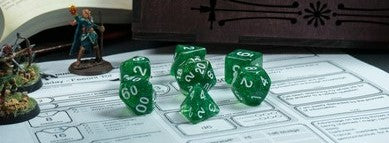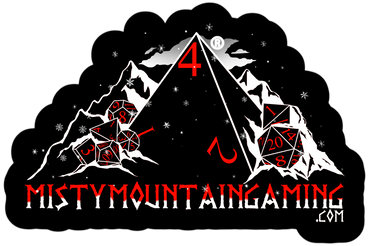
For Fun's Sake!
It’s game night! You collect your dice and character sheet, grab the drinks and Doritos, and gather around your friends for a game of Dungeons and Dragons. You have been looking forward to this ever since last session! It ended on a cliffhanger and you are ready once more to be a hero!
Wouldn’t it be a shame if you did not get to play?
This happened to me recently. I was a player alongside a few friends in my uncle’s game. The character I play, let’s call him “Joe”, is a spy and a saboteur made specially to infiltrate and observe. The villain we were combating was an enchantress known for her ability to magically manipulate and control others… a literal “charmer”. Joe allowed himself to be captured by the villain, withstood her charms, learned her plan and weaknesses, then returned to the party. Unfortunately, the other players around the table suspected that Joe had been enchanted by the villain. They conspired together to capture Joe and shove him in a bag of holding until they had dealt with the villain just in case he might do anything to hinder them.
Thankfully, the DM was on top of things, temporarily stopping gameplay until the situation was resolved, because he could see what was on the horizon: several hours of me (the player) not being allowed to play the game (the reason I attended the session) or participate in the approaching climactic battle (the final confrontation of the campaign).
My fellow players lost sight of the fact that we all showed up to play D&D and were prepared to sacrifice my fun for the sake of not being tricked. It could be argued that they were “roleplaying their characters” or “not metagaming”, but no attempts were made by the players’ characters to discern Joe’s honesty or state of mind. It was just the players, suspicious of some Dungeon Master hijinks, trying to “win” at the cost of a good time.

How Does This Happen?
That isn’t to say that only the players can be guilty of benching a fellow player. Dungeon Masters can do it too, either intentionally or by accident. There are a lot of effects, magic items, and monsters in Fifth Edition that take away a player’s ability to… well, play. Possession, paralyzation, certain charm and fear effects: there are no shortage of effects that take away the player’s ability to act and turn Dungeons and Dragons into a spectator sport.
While these effects can add no end of drama into a situation (something I applaud), they are at their best when used as garnish, not seasoning. They should be sprinkled in for added flair, not something that happens often. Players will tire of being frequently restricted, especially if (God forbid) the same character becomes the victim of such effects over the course of several encounters. Nobody likes to ride the pine during the big game, and the players do not want their characters sidelined for the session.
Or, as in my case, the situation can arise from the players themselves. Their characters may come into conflict over some issue in the game and it takes an ugly turn into PvP. Granted, I think that conflict between characters is a good thing! Luke Skywalker and Han Solo argue and bicker over their different values and worldviews, but they can always be depended on to have each other’s backs. When the player characters turn on one another to the extent that it may remove a player (not character) from the game, it risks that player’s ability to enjoy the game.

Everyone’s Job
Tabletop roleplaying games are fairly unique in that they invite and encourage the participants to become personally invested in the game. They are also special because our ability to enjoy them is dependent on the conduct of others. Similar hobbies generally lack one quality or the other. Board games are good group fun, but we rarely forget that we are playing a game and the events that transpire therein are actually inconsequential. We can become very invested in RPGs in the videogame world, but we are typically alone in those games, or the game is designed so that other players cannot really affect us more than we allow them to. But in the case of Dungeons and Dragons, we can become so concerned with the events of the game that real-life relationships can suffer if those around the table aren’t careful. That’s right, there are high stakes both in and out of the game!
As with any group activity, the responsibility of defending the agency of the players at the table belongs to the group as a whole. The DM may be in the best position to rectify the situation inside the game. They are the authority figure at the table and can, through fiat, make most problems pertaining to the game vanish by introducing new, diverting stimuli. They can also call a halt to the proceedings to sort things out if need be. That may be the optimal situation, but your average Dungeon Master has a lot going on at the table. They are thinking three steps ahead, planning out monster placement for the next combat and busy roleplaying literally everyone else in the world. Oftentimes the players at the table are more in tune with the mood of the game and the joys and frustrations of their fellow players. Checking on your friend or intervening on their behalf will not go unnoticed or unappreciated. Even though the Dungeon Master is in charge of the circumstances of the game, you are all equals in life. Don’t be afraid to speak up if something inside the game is affecting you or a friend outside the game.

Playtime, not Time-out
The game is designed to be dramatic, dangerous, and delightful. Players like their characters to face challenges and have their aims opposed by forces within the world. That builds tension which leads to exciting confrontations! Whether or not they win in those clashes is not as important to the characters as whether or not they get to participate.
Look at Luke Skywalker in Empire Strikes back. He faces Darth Vader in a battle that ultimately ends in a defeat, even losing his hand in the process (and receiving some devastating news)! This is a HUGE moment in the story that is wonderful to watch. He then falls down a chute to where the rest of his party mounts a daring rescue to save him in the nick of time before his strength fails and he plummets to the planet surface below! A thrilling scene that involves all our heroes in some measure! But where was Han Solo, another member of Luke’s adventuring party, while all this was going on? Frozen in carbonite, unable to affect events in any way.
Your players may win or lose, but they will enjoy participating in the drama either way. The player whose character gets frozen in carbonite while the other characters are dealing with the primary antagonist of the campaign is not going to have much fun. Better to have them around contributing to the scene. They will enjoy themselves more if they can do… something. Anything! All alternatives are preferable to nonparticipation.

D&D and Bondage
Now I hope that by this article I have not intimated that I dislike the use of restrictive or subversive elements of the game. Far from it! In fact, I am often teased for frequently putting my characters in dangerous and compromising situations. When a ghost comes to possess my character and turn them against the party, I set to with a will! Roleplaying characters whose agency has been taken away is fun for me… but I need to be on board with it.
Dungeons and Dragons is an intimate experience where you allow yourself to be vulnerable with people you trust, and they in turn are expected to be mindful of your wellbeing and be worthy of that trust. You are completely in control of the character, but you may relinquish some of that control if you think you might lead to something enjoyable. It is a strange comparison, but it is similar to bondage in that way. And, as in bondage, you should feel comfortable admitting when something goes too far and have faith that your wishes will be respected. The game table should be a safe space, after all! As a group and as individuals, discuss how much control each player is willing to let go of, and be mindful of it as you continue to play together!
In Conclusion
We come to this fantasy game to tell fantastic stories, to be fantastic heroes, and to do fantastic things we could not or would not do in real life. Nothing spoils the experience and makes us feel less heroic like NOT being able to be a part of those fantastic stories, to be unable to do those fantastic things. Every moment that agency is taken away from the players at your table, no matter the source, is potentially a moment where the game ceases to be enjoyable. Know your limits and the limits of those you play with. Pay attention to the people around you. And remember the reason you all made time in your week to play this game: to have fun together!
ABOUT THE AUTHOR
Rob has been a Dungeon Master for seven years. He loves to share his experience and enthusiasm for tabletop roleplaying. He recently founded DNDWANNABE, a project dedicated to helping those who play and run D&D take their game to the next level! For encouragement or questions, he can be reached @dndwannabe on twitter.


